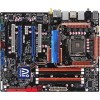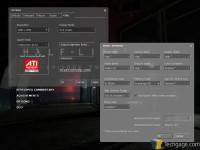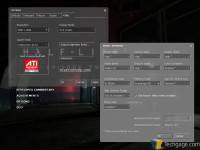- Qualcomm Launches Snapdragon 4 Gen 2 Mobile Platform
- AMD Launches Ryzen PRO 7000 Series Mobile & Desktop Platform
- Intel Launches Sleek Single-Slot Arc Pro A60 Workstation Graphics Card
- NVIDIA Announces Latest Ada Lovelace Additions: GeForce RTX 4060 Ti & RTX 4060
- Maxon Redshift With AMD Radeon GPU Rendering Support Now Available
ASUS P5E3 Premium WiFi-AP @n

X48 is new, but there are many boards already begging for your dollars. We are taking a look at the most robust of them all, the P5E3 Premium, which includes built-in WiFi, a great board design and fantastic overclocking abilities. It would almost be a perfect board if it weren’t for the $375 price tag.
Page 4 – Test Machine Specs & Methodology
At Techgage, we strive to make sure our results are as accurate as possible. Our testing is rigorous, and sometimes exhaustive, but we feel the effort is worth it. In an attempt to leave no question unanswered, this page contains not only our testbed specifications, but also a fully-detailed look at how we conduct our testing.
If there is a bit of information that we’ve omitted, or you wish to throw off recommendations or suggest changes, please feel free to shoot us an e-mail or post in our forums.
When preparing our testbeds for any type of performance testing, we follow these guidelines:
- The OS installation is left as basic as possible, with important updates applied.
- Required drivers from the motherboard CD-Rom are installed. Non-critical applications are omitted.
- We do not install a virus scanner, firewall or any other security application.
- Scrap files from previous testing are cleaned up; recycle bin / trash is emptied.
- Internet is disabled via software driver.
- Computer has proper airflow and room temperature of 80°F or less.
- Hard-drives affected by testing are defragged with Diskeeper 2008 prior to each fresh run.
No hardware during our performance reviews is changed during testing, except for the product-type being reviewed, of course. Our current configuration is as follows:
- Processor: Intel Core 2 Extreme QX9650 3.0GHz
- Motherboard: ASUS P5E3 Premium WiFi-AP @n (Intel X48-based)
-
Compared Motherboards
- ASUS Maximus Extreme (X38-based)
- ASUS Rampage Formula (X48-based)
- Gigabyte X48T-DQ6 (X48-based)
- Intel DX48BT2 (X48-based)
- Memory: OCZ 2GB DDR3-1600 Titanium – Intel XMP Edition (DDR3-1333 7-7-7-15 1.9V)
- DDR2-1066 5-5-5-15 2.1V for DDR2 boards
- Video: ASUS 9800GTX 512MB (NVIDIA 174.35)
- Sound: Onboard HD Audio
- Storage: Seagate 7200.10 320GB x 2
- Power Supply: Corsair HX620W
- Chassis: Antec P182 Mid-Tower
- Etcetera: Windows Vista Ultimate 64-bit
- Cooling: Corsair Nautilus 500
For our testing, we use Microsoft Windows Vista Ultimate 64-bit. We chose to stick to a 64-bit Windows because throughout the past year of usage, we find it to be much more stable than the 32-bit counterpart.
-
Windows Vista Ultimate 64-bit
- Windows is up to date via Windows Update (as of April 10, 2008).
- Before testing begins, the screensaver and all power-related options are disabled.
- Welcome Center and UAC is disabled.
- A recent NVIDIA driver for the 9-series is used (174.35).
Once we set up our OS’, nothing changes unless we revamp our entire methodology, which doesn’t happen too often.
Gaming
In an attempt to deliver accurate results, games that we test with are played through manually, with the average FPS recorded with the help of FRAPS 2.9.4. In our personal tests, we have found that manually benchmarking games is the best way to deliver accurate results, since time demos rely heavily on the CPU.
In order to deliver the best results, each title we choose is explored to find the best possible level for our benchmarking. Once a level is chosen, we play through in order to find the best route, and then in future runs, we stick to that route as close as possible. We are not robots, so we cannot make sure that each run is identical, but they will never be far off from each other. As we see in our results, scaling is good, so we are confident that our methodology is a good one.
Because performance between motherboards shouldn’t vary by much to begin with, we choose to run a single game for our tests, along with Futuremark’s 3DMark Vantage.
Half Life 2: Episode Two
|
1680×1050
|
2560×1600
|
On the next page, we’ll kick off our results with SYSmark 2007 Preview.
|
|
Support our efforts! With ad revenue at an all-time low for written websites, we're relying more than ever on reader support to help us continue putting so much effort into this type of content. You can support us by becoming a Patron, or by using our Amazon shopping affiliate links listed through our articles. Thanks for your support!







